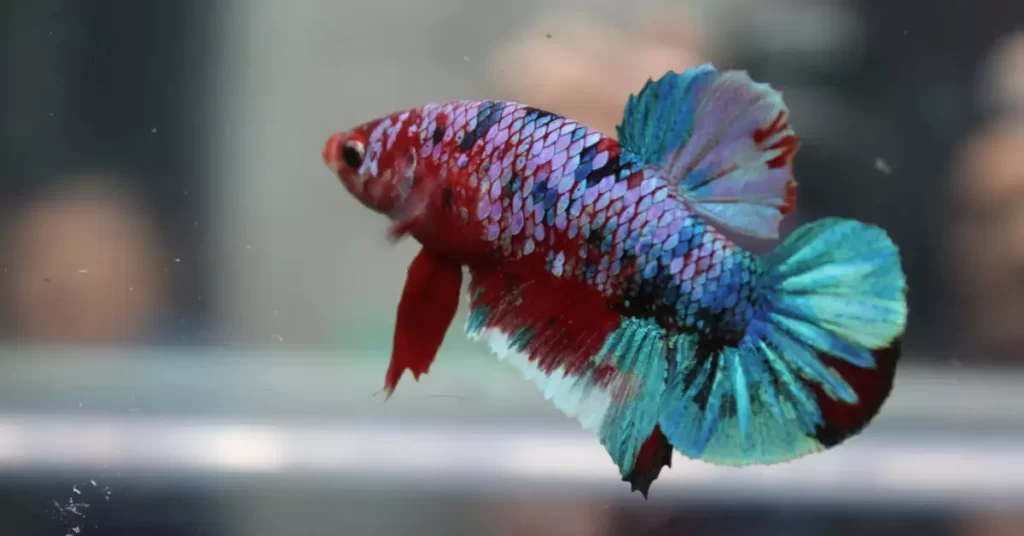Many aquarium enthusiasts have wondered if mirrors are bad for betta fish. In this comprehensive guide, we’ll delve into the topic and address the effects mirrors have on bettas, whether they are harmful or beneficial, and how to use mirrors in your betta’s tank safely. Let’s dive in!
The Betta Fish: A Brief Overview
Betta fish, also known as Siamese fighting fish, are native to Southeast Asia and are popular pets due to their vibrant colors and unique fin shapes.
They are labyrinth fish, meaning they can breathe atmospheric air, which allows them to survive in shallow waters and low-oxygen environments.
Understanding Betta Fish Behavior
Betta fish are territorial and aggressive by nature, especially when it comes to their own kind.
Males, in particular, will fight other males, often to the death, to protect their territory. This aggressive behavior is the reason why bettas are commonly kept in separate tanks.
What Happens When a Betta Sees Its Reflection?
When a betta fish encounters its reflection in a mirror, it perceives the image as another betta fish invading its territory.
This triggers their aggressive response, and they will flare their fins, display vibrant colors, and attempt to attack their reflection.
Positive Effects of Mirrors on Betta Fish
- Stimulation: Using a mirror can provide mental stimulation and exercise for your betta fish. Encountering their reflection can give them something to do, preventing boredom and promoting a more active lifestyle.
- Exercise: When a betta fish flares at its reflection, it is exercising its muscles. This can help keep your betta fish healthy and agile.

Negative Effects of Mirrors on Betta Fish
- Stress: Constant exposure to their reflection may cause chronic stress in betta fish. Prolonged stress can weaken their immune system and make them more susceptible to diseases.
- Overexertion: If a betta fish is too aggressive or spends too much time flaring at its reflection, it may become exhausted and overexert itself, leading to health issues.
How to Use Mirrors Safely with Your Betta Fish
To use mirrors safely with your betta fish, follow these guidelines:
- Limit exposure: Ensure that your betta fish is only exposed to its reflection for short periods. Limit mirror time to around 5-10 minutes per day.
- Monitor your betta: Watch your betta fish during mirror sessions to ensure it does not become overly aggressive or stressed. If you notice signs of distress, remove the mirror immediately.
- Choose the right mirror: Use a small, handheld mirror or a mirror specifically designed for betta fish. Avoid using large mirrors that cover the entire tank, as this may cause constant stress for your betta.
Alternatives to Mirrors for Betta Fish
If you want to provide mental stimulation and exercise for your betta fish without using a mirror, consider these alternatives:
- Enrich the environment: Adding plants, decorations, and hiding spots can make your betta’s tank more interesting and engaging.
- Toys: Some betta fish enjoy playing with toys like ping pong balls or floating logs. Experiment with different toys to find what your betta enjoys.
- Feeding puzzles: Providing food in a way that encourages your betta to work for it, like live or frozen food that moves around, can offer mental stimulation and encourage natural hunting behaviors.
Signs of Stress in Betta Fish
It’s essential to recognize signs of stress in your betta fish to ensure their well-being. Common indicators of stress in betta fish include:
- Loss of color
- Loss of appetite
- Rapid breathing or gasping at the surface
- Clamped fins
- Lethargy or hiding
If you notice any of these signs, take steps to identify the cause and make necessary changes to improve your betta’s environment.
Tips for a Healthy Betta Fish Environment
To create a healthy environment for your betta fish, follow these guidelines:
- Provide a suitable tank size: A minimum of 5 gallons is recommended for a betta fish to thrive.
- Maintain optimal water quality: Perform regular water changes, and monitor ammonia, nitrite, and nitrate levels to ensure a healthy aquatic environment.
- Keep the water temperature stable: Betta fish thrive in water temperatures between 76°F and 82°F (24°C-28°C).
- Provide hiding spots and decorations: Betta fish appreciate places to hide and explore.
- Feed a balanced diet: Offer a variety of high-quality betta pellets, flakes, and occasional live or frozen foods to meet your betta’s nutritional needs.
Frequently Asked Questions
How long should I let my betta fish see its reflection?
Limit your betta fish’s exposure to its reflection to around 5-10 minutes per day to prevent stress and overexertion.
Can betta fish live with other fish in the same tank?
While betta fish are territorial, they can coexist with certain non-aggressive, non-finch-nipping fish species in a community tank, given enough space and hiding spots.
Always research compatibility before introducing new tankmates.
How often should I change the water in my betta fish tank?
Perform a 25% water change weekly in a cycled, filtered tank, and monitor water parameters to ensure a healthy environment for your betta fish.
Conclusion
While mirrors can provide mental stimulation and exercise for betta fish, excessive exposure to their reflection can lead to stress and health issues.
It’s essential to use mirrors safely and responsibly, limiting exposure and monitoring your betta’s behavior.
By providing a healthy environment and a variety of stimulating activities, you can ensure that your betta fish thrives and lives a happy, healthy life.